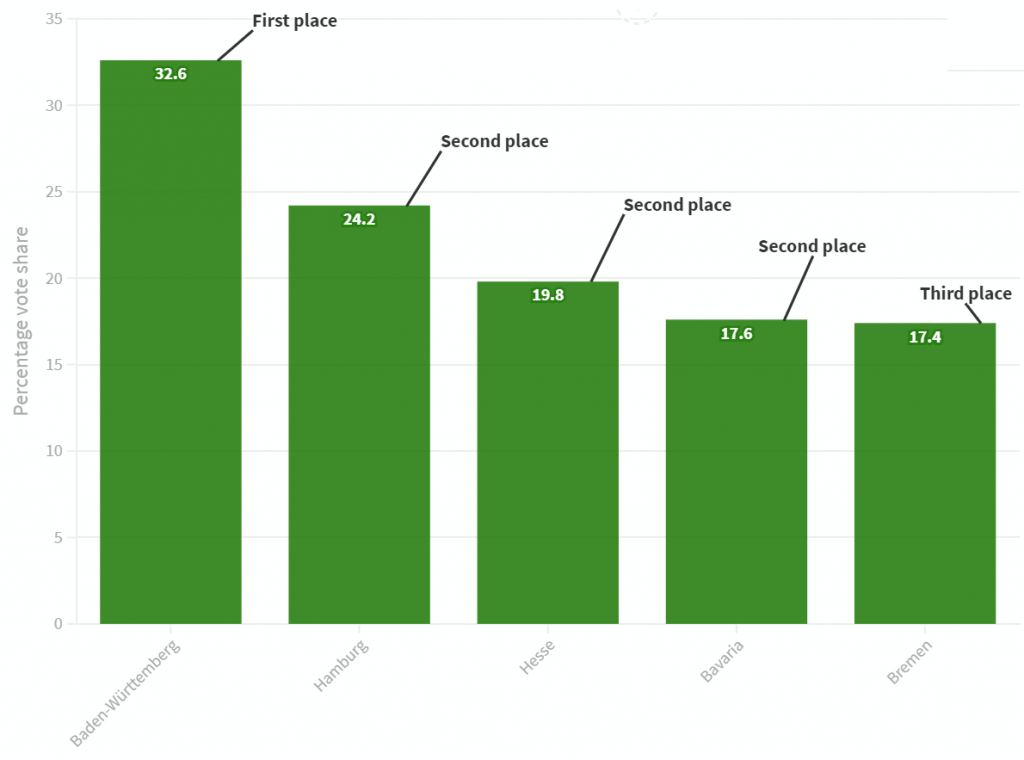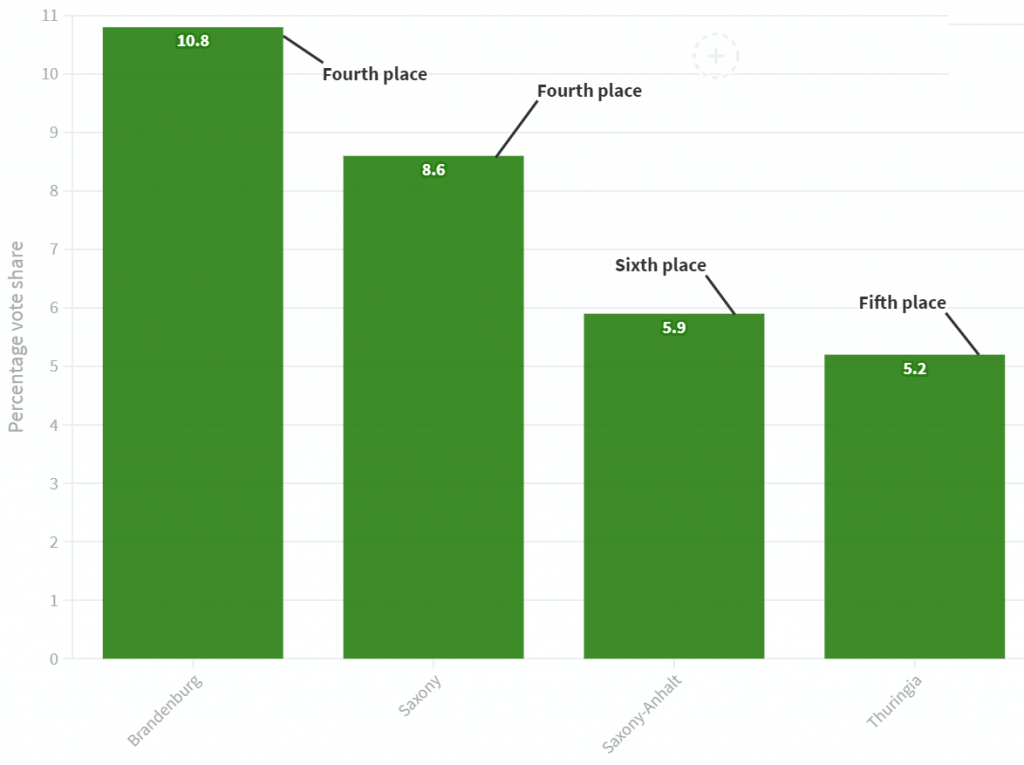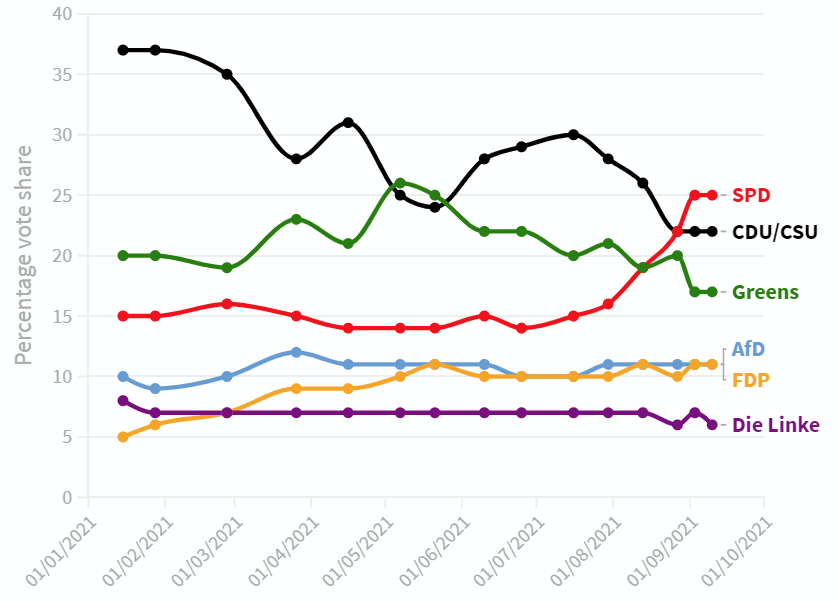The German Greens have seen their polling numbers decline in the final weeks of campaigning before Germany’s federal election on 26 September. Yet as Charles Lees explains, with the party still in third place, it remains highly likely the Greens could play a major role in the country’s next government.
The German Greens entered 2021 in upbeat political mood. In the last federal election in 2017, the party had confounded low expectations, polling a respectable 8.9 per cent of the vote (up slightly on the 2013 federal election) and winning 67 seats (up four from 2013). The 2017 election still left the Greens as the smallest Fraktion in the Bundestag, but the last four years have seen the party perform well in several state elections and in elections to the European Parliament.
With a week to go until the 2021 federal election, the Greens’ poll numbers indicate they are running in third place behind the centre-left SPD and centre-right CDU/CSU, with support around the mid to high-teens. This level of support is significantly lower than the party’s poll numbers earlier in the year, but given potential areas of political agreement with both the SPD and CDU/CSU, it gives the Greens a very good chance of playing a key role in forming the new German government after the election.
Encouraging signs for the Greens
The Greens continue to perform well in elections in the states of the old West Germany, including in October 2018 in Bavaria where they finished second to the CSU, and Hesse where they finished second to the CDU. They also finished third in May 2019 in Bremen behind the CDU and the SPD, second to the SPD in Hamburg in February 2020, and were the largest party in the state election in their electoral stronghold of Baden-Württemberg in March 2021, returning to government.
Figure 1: State election results for the German Greens in the states of the former West Germany (2018-21)
Note: Chart created with Flourish.
However, the party also continues to struggle politically in the states of the former East Germany, coming fourth in September 2019 in Brandenburg behind the SPD, the right wing populist AfD, and the CDU; fourth again in September 2019 in Saxony behind the CDU, AfD, and the Left; fifth in October 2019 in Thuringia behind the Left, AfD, CDU, and SPD; and sixth in June 2021 in Saxony-Anhalt, where they are the smallest party in the state parliament behind the CDU, AfD, Left, SPD, and the liberal FDP.
Figure 2: State election results for the German Greens in the states of the former East Germany (2019-21)
Note: Chart created with Flourish.
Nevertheless, despite their weakness in the eastern states, the Greens were encouraged by their good performance in the May 2019 European Parliament election, in which they polled 20.5% of the national vote, winning 21 seats (up 10 on the previous election) and becoming the second largest German party delegation in the European Parliament, after the CDU/CSU. The Greens received further encouragement from the fact their good performance was part of a Europe-wide surge in support for Green parties in the European Parliament elections.
The Greens’ optimism was further enhanced by the initial positive impact of their Chancellor candidate, Annalena Baerbock. Baerbock is a graduate of the London School of Economics and was a political adviser to the Greens before entering the Bundestag in 2013 and becoming co-chair of the party in 2018. Earlier in the year, the Greens were polling at levels close to those of the CDU/CSU, leading to hopes that she might have a realistic chance of becoming Chancellor. As Figure 3 below shows, this hope has subsided, but with the party still in third place, the question remains: are the Greens on the cusp of government?
Figure 3: Polling for the 2021 German federal election
Note: Chart created with Flourish using data from Forschungsgruppe Wahlen.
We are still a week out from the federal election, but the polling indicates that the SPD, under its popular Chancellor candidate Olaf Scholz, appears on track to be the largest party in the new Bundestag. Such an outcome would run counter to the long-term trend of a declining SPD vote share that goes back almost twenty years and is considered part of the wider ‘crisis of social democracy’ that we have seen across Europe. It would also give the SPD the first chance to try to form a viable coalition with whatever distribution of parties and seats the election produces.
Barring any unexpected surprises on election day, there are several different coalition options that are both theoretically possible and politically feasible. These are, first, a repeat of the current ‘Grand’ coalition between the CDU/CSU and SPD; second, a repeat of the 1998-2005 ‘Red-Green’ coalition between the SPD and Greens; third, a ‘Black-Green’ coalition between the CDU/CSU and Greens; fourth a ‘Black-Yellow’ coalition between the CDU/CSU and FDP; and then a number of more complex options such as the ‘Traffic Light’ (SPD, Greens, and FDP), ‘Jamaica’ (CDU/CSU, Greens, FDP), ‘Red-Red-Green’ (SPD, Greens, Linke) and even the so-called ‘Germany’ (CDU/CSU, SPD, FDP) and ‘Kenya’ (CDU/CSU, SPD, Greens) options.
Coalition studies posit that coalition management becomes more difficult as the number of parties increases and, all things being equal, a two party ‘Grand’, ‘Red-Green’, ‘Black Green’, or ‘Black-Yellow’ coalition is quite a likely outcome of the coalition bargaining process after the elections. This means it is highly possible that the Greens will find themselves back in government.
Looking ahead
It remains to be seen how well the Greens perform in the federal election. The party gets most of its support from more affluent socio-economic groups and from voters with more progressive value orientations, including amongst young people. By contrast, the party tends to perform badly with poorer voters and those with a conservative and/or authoritarian value orientation.
But if the Greens were to enter government, it would present a challenge to both the CDU/CSU and the SPD. The Greens have been (slightly cruelly) characterised as ‘a vegetarian subdivision of the Christian Democrats’, which means there is great potential for the CDU/CSU constructing a platform for government with them, but this also means that the Greens and the CDU/CSU have to compete for much of the same electoral base – which complicates coalition management. For the SPD, the Greens have been a reliable coalition partner in the past but there is no guarantee that would be the case in the future and the two parties are not as close culturally as they are ideologically adjacent.
If the Greens enter government, they will try to push back against Germany’s highly transactional approach – pursued by both CDU/CSU and SPD-led governments – to authoritarian states with which it has significant trade links. Annalena Baerbock has argued that Germany needs to take the lead in the European Union against human rights abuses around the world, including those carried out by states that are some of Germany’s largest export markets.
This means inter alia standing up to China over its treatment of its Muslim citizens, and possibly withdrawing support from the controversial Nord Stream 2 pipeline between Germany and Russia. The coming weeks are set to reveal if the Greens will eventually enter government and ensure the party’s aspirations for Germany are achieved.
Note: This article gives the views of the author, not the position of EUROPP – European Politics and Policy or the London School of Economics. Featured image credit: Bündnis 90/Die Grünen Nordrhein-Westfalen (CC BY-SA 2.0)






